Impacts of Isolation on Mental Health
Stories | October 4, 2021
Applying the lessons from Ebola to the COVID-19 crisis
As countries rapidly formulate appropriate responses to the global coronavirus disease 2019 (COVID-19) pandemic, the World Health Organisation (WHO) has issued an urgent statement noting, “Unless governments and communities take action discrimination against people with disabilities could increase during the COVID-19 pandemic”. It is useful to examine the challenges people living with disabilities – specifically mental illness – in low-income countries face and, secondly to advance some suggestions in order to best formulate a response that is mental health inclusive, and how CBM can offer support to ensure that vulnerable people do not fall down the cracks.
Recognising the impact of isolation on mental health
Challenges associated with periods of prolonged isolation and the breakdown of regular routines and support systems present a series of unexpected adaptation. Many patients who survived Ebola and care-givers reported a change in their mental health, noting feelings of grief, guilt, shame and depression linked to the loss of loved ones. People who had been separated from loved ones as they battle the Ebola disease, or succumbed to the illness also noted feelings of distress, guilt and shame. According to CBM International mental health advisor, Julian Eaton, most people will experience some mental distress during periods of isolation, but this effect can be amplified for some people living with mental illnesses.
“Isolation breaks down support when people need support more than ever” Julian Eaton
Periods of isolation relating to Ebola saw a disruption to normal routines and lifestyles. Where this became deeply problematic was in relation to accessing medication for mental illness or chronic pain medication. Many people rely on family and support workers to provide medication and without this service, this may lead to profound health concerns relating to their own and others health and well-being.
Isolation can have adverse impacts on people living in institutions or by themselves. Where people living with mental illness receive institutionalised care, they are at increased risk of neglect and abuse. In times of reduced contact such as epidemics, Eaton cautions that these people are amongst the most at risk groups.
In low-income countries were government capacity is low, the burden of care and support is not facilitated through extensive welfare system and safety nets but rather carried by family members and communities. During the Ebola epidemic existing healthcare and designated Ebola units struggled to respond to the numbers of patients requiring care. This leaves much of the burden of patient care on family and support networks. Often family members were ill equipped or lacked protective wear to prevent further contamination. Other cases noted occasions were family members had refused to transport their relatives to treatment facilities, preferring rather to treat them at home and spreading the virus in doing so.
“We need to reinforce existing networks of support such as family or self-help group to ensure people have access to help” Julian Eaton
Responding to the Ebola crisis required reinforcing the exiting social and formal healthcare networks. Strengthening these networks through greater support structures and access to healthcare providers and services will enable people to retain access to medication and support structures to maintain their quality of life. This may require greater training services for community mental health providers to ensure they are equipped with the knowledge and resources necessary. In tackling the Ebola crisis, this support service came in the form of training programs and use of additional mental health support workers and professionals provide assistance to Ebola-affected regions. Ultimately, Eaton stresses what is needed is a referral mechanism, that enables community workers to identify, recognise and refer people suffering with mental health concerns to further treatment services.
In times of health crisis, mental health must be a priority to ensure the resilience of the community. Now, more than ever we recognise this necessity in the work CBM does with communities around the world.
October 10th is World Mental Health Day.
Want to participate?
- Download the toolkit to learn more about the mental health challenges faced by people with disabilities, living in poverty.
- Help us in strengthening their voices by donating to our mental health programs.
https://www.cbm.org.au/stories/impacts-of-isolation-on-mental-health
Related Stories

Week 3 – Lent series 2026
This week, we’re reflecting with our colleague Christian, Supporter Relationship Specialist at CBM Australia, who turns to John 13:34–35 (NIV): “A new command I give...

Week 2 – Lent series 2026
As we continue our Lent journey, we’re grateful to share a heartfelt reflection from CBM Australia’s Head of Program Impact Operations, Kieran Cummins, who...

Building inclusive, climate resilient communities in Bangladesh
Highlights from DFAT Post’s visit In January 2026, representatives from the Australian High Commission in...
